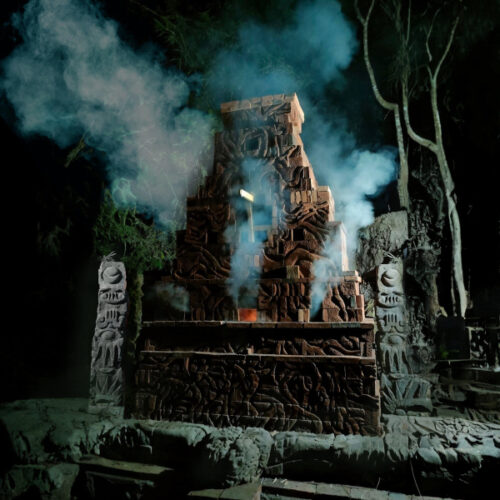As enigmatic as ever, Indonesia’s top experimental music export recently released Vajranala, a hushed, atmospheric album exploring the power and influence of shamanism. In this contemporary reimagining, Senyawa convincingly evokes the transcendental energy of traditional Javanese rituals.
What’s striking about Vajranala is the much more pared-down approach to the use of Wukir Suryadi’s invented instruments. On this album, their use is primarily timbral and rhythmic. This has always been the case in Senyawa’s music, but here there are very few melodic moments that could constitute a catchy hook. Consequently, the album moves away from songlike structures such as those found on Acaraki (2014). Instead, we have fairly long pieces where rhythmic ostinati and vocal mantras abound. The strength of these pieces lies in the repetition and accumulation of musical gestures. On the instrumental side, the articulations are not very complex, but create a bath of sound in which Rully Shabara dramatically displays a variety of vocal techniques and declamations. The tension is constant in these six tracks, and brilliantly reinforces the ritualistic connotation.
The simplicity of the ideas and the catharsis of their intensity can sometimes recall the climaxes in Swans’ music, albeit within an entirely different sonic universe. A common reflex among critics has often been to speak of Senyawa’s traditional influences. However, a deeper knowledge of Indonesian music reveals little to corroborate these claims, although it’s easy to see why the association is made. The amplification of instruments made of wood and bamboo and the Indonesian lyrics, sometimes sung pentatonically, are just the most striking examples of what distinguishes Senyawa’s language from Western music. And yet, it should come as no surprise that Shabara and Suryadi both grew up listening to Mr. Bungle, John Zorn and Sunn O.
It’s the symbiosis between all these elements – which we’d be wrong to still find paradoxical these days – that makes Senyawa such a unique project. Using the vocabulary and sound palette, they’ve created; the duo can reincarnate themselves indefinitely and surprise with every stylistic turn.
























